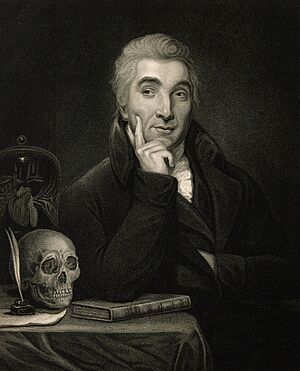John Haighton facts for kids
John Haighton (born around 1755 – died March 23, 1823) was an important English physician and physiologist. He made significant contributions to medicine and teaching during his lifetime.
Contents
Life and Early Career
John Haighton was born in Lancashire, England, around 1755. He began his medical training as a student of Mr. Else at St Thomas' Hospital in London. Later, he worked as a surgeon for the Guards regiments, which are special military units.
Haighton soon became a demonstrator of anatomy at St. Thomas' Hospital. This meant he helped teach students about the human body. He was known as a very skilled surgeon and anatomist. Even the famous surgeon John Hunter almost hired him to help with his lectures.
Teaching and Research
In 1789, Haighton decided to focus more on physiology and midwifery. Physiology is the study of how living things work. Midwifery is the practice of helping women during childbirth. He gave lectures on both subjects for students at St. Thomas' and Guy's Hospitals.
He earned his medical degree (M.D.) in 1794 from Kings College, Aberdeen. Although he was a doctor, he never became a full physician at a hospital.
Personality and Contributions
Haighton was known for being a good lecturer. He was also an excellent obstetric operator, meaning he was very good at performing surgeries related to childbirth. He conducted many experiments in physiology. Some people found his experiments very intense.
He often led meetings at the Physical Society of London at Guy's Hospital. He also helped edit a medical journal called Medical Records and Researches. In 1790, he won a silver medal from the Medical Society of London for his work on deafness.
Later Years and Legacy
In his later years, John Haighton suffered from asthma. His nephew, Dr. James Blundell, began helping him with his lectures in 1814. Dr. Blundell took over all the lectures by 1818.
Haighton was recognized for his scientific work. In 1810, he became a member of the American Philosophical Society in Philadelphia. He was also elected a Fellow of the Royal Society in 1815. Being a Fellow of the Royal Society is a great honor for scientists.
John Haighton passed away on March 23, 1823. His nephew, James Blundell, described him as a kind, generous, and honest person. He was also seen as a careful and capable physician.
 | Valerie Thomas |
 | Frederick McKinley Jones |
 | George Edward Alcorn Jr. |
 | Thomas Mensah |


